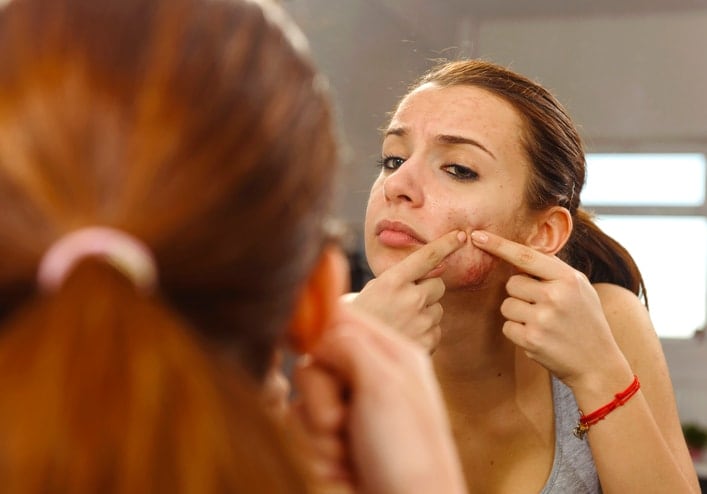
You follow all the rules for good skin care, and you’re still battling acne breakouts. It could be that your adult acne is genetic.
What Does It Mean to Have Adult Acne?
Some adults have acne in their 30s, 40s, and well beyond into their late 50s. While acne isn’t a harmful or dangerous condition, it can cause scarring of the skin and have a psychological impact on the acne sufferer. When an adult is suffering from what is perceived as a “teen” condition, embarrassment, shame, and a loss of self-confidence can occur.
What Are the Causes of Adult Acne?
Adult acne can be caused by a variety of factors, such as:
- Stress
- Changes in hormone levels, such as menopause or switching or stopping birth control pills
- Medications, including corticosteroids, lithium, and anti-seizure drugs
- Bad habits such as picking at the face or wearing makeup to bed
- Cleansing too much or not enough
- Using the wrong skin care products
- Eating foods high in sugar
- A genetic predisposition for acne
Does Genetics Play a Role?
There is no single “acne gene”, but acne does tend to run in families. Research shows there are people who may have a genetic predisposition for acne. People with this predisposition are more likely to get adult acne. Even though you can’t change your DNA, if acne runs in your family, there are still ways you can successfully treat adult acne.
How Can Adult Acne Be Effectively Treated?
Mild acne can be treated by your dermatologist using over-the-counter or prescription topical medications in the form of gels, serums, creams, lotions, pads, or soaps. Topical treatments are spread on the skin. The most common over-the-counter medications contain benzoyl peroxide, salicylic acid, sulfur, or resorcinol.
Moderate to severe acne with inflammation may need a course of treatment involving prescription topical and/or oral medications. Prescription medications may include antibiotics, prescription-strength benzoyl peroxide, vitamin A derivatives (retinoids), azelaic acid, or sulfur-containing products.
Over-the-counter and prescription topical medicines are recommended according to your skin type. If you have sensitive skin, creams and lotions are good options because they provide the added benefit of acting as a moisturizer.
Your dermatologist may use both prescription topical and an oral antibiotic medication in treating your adult acne because oral antibiotics help prevent bacteria growth and reduce inflammation. Examples of antibiotics that effectively treat adult acne include minocycline, tetracycline, and doxycycline.
Topical and oral prescription medications can result in side effects. Also, the benefits aren’t immediately visible. For some, medications may cause acne to worsen before it improves. Be sure you talk about all your options with your dermatologist.
How Can Adult Acne Breakouts Be Prevented?
You can help prevent adult acne breakouts in several ways:
- Adopt a good skin care routine where you care for your face regularly with products that are right for your skin type. Your dermatologist can recommend products and techniques for cleansing and hydrating your skin without causing more inflammation.
- Avoid bad skin care habits such as picking at your skin or sleeping with makeup on.
- Eat a healthy diet that’s also low in sugar.
- See your dermatologist who will put together an acne-fighting treatment plan that may include over-the-counter and prescription medications, as well as the best skin care products that work to reduce or prevent further breakouts.
If you’d like to find out more about the proper ways to care for your skin, the right products to do it with, and successful adult acne treatments, the dermatologists at the Greater Miami Skin & Laser Center can help. Contact us today for a consultation.

